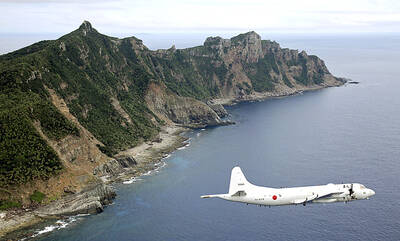Deputy Minister of Education Lin Tsung-ming (林聰明) confirmed yesterday that the ministry planned to recognize Chinese credentials obtained after 1997.
“Basically [we are considering recognizing credentials] obtained after 1997, but we have not finalized the plan,” Lin said when approached for comment. He did not elaborate.
Lin said the ministry would hold public hearings to gauge public opinion on the matter, adding that the ministry planned to first recognize credentials issued by 41 top Chinese universities that China has provided with extra resources since 1985, including Peking University, Tsinghua University, Tianjin University and Fudan University.
At another setting, however, Minister of Education Wu Ching-ji (吳清基) said the ministry would not recognize any medical credentials from China.
Meanwhile, Wu said Taiwanese universities could begin enrolling students from China from June if bills cleared the legislature by the end of the current legislative session.
Wu said public universities would be allowed to recruit only graduate students, while private universities could recruit undergraduates.
Chinese students attending Taiwanese public universities would have to pay the same tuition fees as those at Taiwan’s private universities, Wu said.
The ministry has listed recognition of Chinese credentials and recruitment of students from China as one of the ministry’s major administrative goals since the Chinese Nationalist Party (KMT) came into office last year.
However, proposed amendments to the law have been brought to a standstill because of a boycott by the Democratic Progressive Party (DPP).
In response to the ministry’s plan, DPP Chairperson Tsai Ing-wen (蔡英文) said the government’s policy to allow Chinese to study in Taiwan could pose a threat to Taiwanese students’ future employment opportunities and urged the government to carefully assess the situation before opening the nation’s education system to Chinese students.
“In the past few years, allowing Chinese students to come to Taiwan has been a highly sensitive issue because it relates to the competitiveness of Taiwan’s education industry, especially now, when people are having fewer children. We already have too many schools that can’t find enough students,” Tsai said.
Allowing Chinese to study in Taiwan could squeeze local students out of the domestic job market, she said.
She said that cross-strait educational exchanges not only touch upon sensitive political issues, but also expose the public to vastly different values on freedom of thought by both sides.
The DPP government handled the issue with great care, Tsai said, cautioning the administration to do likewise.
Asked for comment, KMT Legislator Cheng Chin-ling (鄭金玲) of the Education and Culture Committee said accepting Chinese credentials and students could serve as a stimulus for Taiwanese universities.
Meanwhile, the Taiwan Students Union — an organization of Taiwanese students studying in China — issued a statement criticizing the ministry for only planning to give recognition to credentials from 41 Chinese universities.
The union said the recognition should apply retroactively without limit rather than only for diplomas obtained since 1997.
ADDITONAL REPORTING BY JENNY W. HSU

MISINFORMATION: The generated content tends to adopt China’s official stance, such as ‘Taiwan is currently governed by the Chinese central government,’ the NSB said Five China-developed artificial intelligence (AI) language models exhibit cybersecurity risks and content biases, an inspection conducted by the National Security Bureau (NSB) showed. The five AI tools are: DeepSeek, Doubao (豆包), Yiyan (文心一言), Tongyi (通義千問) and Yuanbao (騰訊元寶), the bureau said, advising people to remain vigilant to protect personal data privacy and corporate business secrets. The NSB said it, in accordance with the National Intelligence Services Act (國家情報工作法), has reviewed international cybersecurity reports and intelligence, and coordinated with the Ministry of Justice Investigation Bureau and the National Police Agency’s Criminal Investigation Bureau to conduct an inspection of China-made AI language

BOOST IN CONFIDENCE: The sale sends a clear message of support for Taiwan and dispels rumors that US President Donald Trump ‘sold out’ the nation, an expert said The US government on Thursday announced a possible sale to Taiwan of fighter jet parts, which was estimated to cost about US$330 million, in a move that an expert said “sends a clear message of support for Taiwan” amid fears that Washington might be wavering in its attitude toward Taipei. It was the first announcement of an arms sale to Taiwan since US President Donald Trump returned to the White House earlier this year. The proposed package includes non-standard components, spare and repair parts, consumables and accessories, as well repair and return support for the F-16, C-130 and Indigenous Defense Fighter aircraft,

CHECKING BOUNDARIES: China wants to disrupt solidarity among democracies and test their red lines, but it is instead pushing nations to become more united, an expert said The US Department of State on Friday expressed deep concern over a Chinese public security agency’s investigation into Legislator Puma Shen (沈伯洋) for “secession.” “China’s actions threaten free speech and erode norms that have underpinned the cross-strait ‘status quo’ for decades,” a US Department of State spokesperson said. The Chongqing Municipal Public Security Bureau late last month listed Shen as “wanted” and launched an investigation into alleged “secession-related” criminal activities, including his founding of the Kuma Academy, a civil defense organization that prepares people for an invasion by China. The spokesperson said that the US was “deeply concerned” about the bureau investigating Shen

DISPUTE: A Chinese official prompted a formal protest from Tokyo by saying that ‘the dirty head that sticks itself out must be cut off,’ after Takaichi’s Taiwan remarks Four armed China Coast Guard vessels yesterday morning sailed through disputed waters controlled by Japan, amid a diplomatic spat following Japanese Prime Minister Sanae Takaichi’s comments on Taiwan. The four ships sailed around the Senkaku Islands — known as the Diaoyutai Islands (釣魚台) to Taiwan, and which Taiwan and China also claim — on Saturday before entering Japanese waters yesterday and left, the Japan Coast Guard said. The China Coast Guard said in a statement that it carried out a “rights enforcement patrol” through the waters and that it was a lawful operation. As of the end of last month,